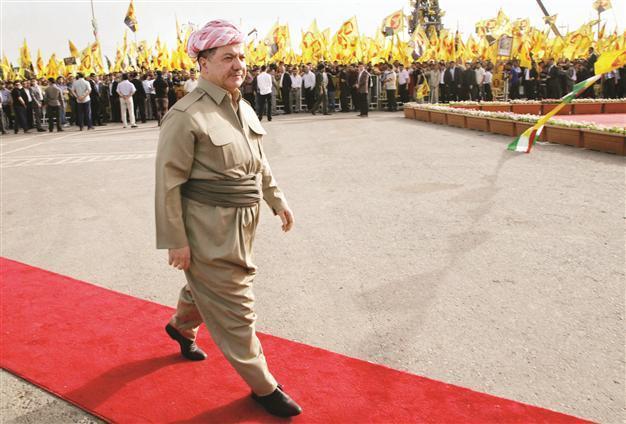Iraqi Kurds signal parting ways if Baghdad talks fail
ARBIL - Reuters

KRG President Barzani warns of partition if talks with Baghdad fails. AFP photo
Iraqi Kurdistan could be forced to seek a “new form of relations” with the central government in Baghdad if negotiations fail to resolve their disputes over oil and land, the president of the Kurdistan Regional Government (KRG) has said.Masoud Barzani, who has hinted at full independence from Iraq in the past, told Reuters that the current round of talks, which started last month, marked the final opportunity to end a feud that has strained Iraq’s uneasy federal union to the limit.
“The current talks will be the last chance. There has been a softening of their [Baghdad’s] position, but practically speaking, there has been no progress,” Barzani said in an interview at his presidential office outside the northern city of Arbil.
“Either we will be able to reach an agreement ... or we will have to think of a new form of relations between the region and Baghdad,” he said, declining to elaborate.
Ten years after the U.S.-led invasion of Iraq, a stable power-sharing arrangement between Shiite, Sunni and Kurdish factions is still elusive and a recent intensification of violence has prompted warnings of civil war.
But the KRG has managed to insulate itself against the fallout, and is enjoying unprecedented prosperity for a region that was once the most impoverished and repressed in Iraq.
The northern enclave of more than 4.5 million people is also pursuing increasingly independent energy and foreign policies, antagonizing Baghdad to the point that both sides have deployed troops to reinforce positions along their disputed internal border.
Even if a compromise were to be found with Baghdad, statehood remains the ultimate objective for Barzani. “It’s the goal of all the Kurdish people and it’s a right,” said Barzani. “I believe that to be the final solution.”
Key to realizing that ambition is oil. In recent years, the Iraqi Kurds have signed contracts on their own terms with the likes of Exxon Mobil, Total and Chevron Corp. That has infuriated the central government, which insists it alone is entitled to control exploration of Iraq’s oil.
The regional government used to ship crude through a pipeline network controlled by the central government and receive a share of the national budget. But exports via that channel dried up last December due to a row over payments for oil companies operating in the region. The region says the Constitution allows it to exploit the reserves under its soil, and is building the final leg of an independent export pipeline that could help bypass the central government and send as much as 300,000 barrels per day of oil to international markets through Turkey. Turkey has cultivated close energy ties with the KRG, despite objections from the United States, which fears the region’s increasingly independent oil policy will lead to the breakup of Iraq.
“Both sides [Turkey and the KRG] are determined to make progress in terms of this relationship,” Barzani said. “When you have oil, oil will find its own way.”
On the peace process of Turkey, asked whether he had any qualms about receiving several hundred militants of the outlawed Kurdistan Workers’ Party (PKK) in the mountains of northern Iraq, Barzani said there was no cause for concern. “We are expecting that after the problem is solved, they will go back to their homes.”
















